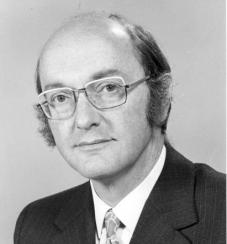Donald Davies
Donald Watts Davies (7 June 1924 – 28 May 2000) was a Welsh computer scientist who is best known for his pioneering work in the field of computer networking. He is credited with independently inventing the concept of packet switching, which is a fundamental technology used in the development of the Internet.
Early Life and Education[edit | edit source]
Donald Davies was born in Treorchy, Wales. He attended Imperial College London, where he studied physics and graduated with a first-class degree in 1943. He later pursued a PhD in mathematics at the same institution.
Career[edit | edit source]
National Physical Laboratory[edit | edit source]
In 1947, Davies joined the National Physical Laboratory (NPL) in Teddington, where he initially worked on the design and development of the Pilot ACE computer under the guidance of Alan Turing. The Pilot ACE was one of the earliest stored-program computers.
Packet Switching[edit | edit source]
In the mid-1960s, Davies began to explore the idea of packet switching as a more efficient method of data communication compared to the traditional circuit switching used in telephone networks. He proposed that data could be broken into smaller packets, sent independently across a network, and reassembled at the destination. This concept was crucial in the development of modern computer networks and the Internet.
Davies' work on packet switching was conducted independently of similar research by Paul Baran at the RAND Corporation in the United States. Both researchers are credited with the invention of packet switching, which became the foundation for the ARPANET and later the Internet.
Later Work[edit | edit source]
In the 1970s, Davies continued his work at the NPL, focusing on the development of the NPL network, one of the first packet-switched networks. He also contributed to the development of the X.25 protocol, which was widely used in early wide area networks (WANs).
Legacy[edit | edit source]
Donald Davies' contributions to computer science and networking have had a lasting impact on the field. His work on packet switching laid the groundwork for the development of the Internet, and he is remembered as one of the key figures in the history of computer networking.
Awards and Honors[edit | edit source]
Davies received numerous awards and honors for his contributions to computer science, including being named a Fellow of the Royal Society (FRS) in 1987. He was also awarded the Computer Pioneer Award by the IEEE Computer Society in 1992.
Personal Life[edit | edit source]
Donald Davies was married and had two children. He passed away on 28 May 2000 in Esher, Surrey, England.
Related Pages[edit | edit source]
- Packet switching
- National Physical Laboratory (United Kingdom)
- Pilot ACE
- Alan Turing
- Paul Baran
- ARPANET
- X.25
- Internet
Categories[edit | edit source]
Search WikiMD
Ad.Tired of being Overweight? Try W8MD's physician weight loss program.
Semaglutide (Ozempic / Wegovy and Tirzepatide (Mounjaro / Zepbound) available.
Advertise on WikiMD
|
WikiMD's Wellness Encyclopedia |
| Let Food Be Thy Medicine Medicine Thy Food - Hippocrates |
Translate this page: - East Asian
中文,
日本,
한국어,
South Asian
हिन्दी,
தமிழ்,
తెలుగు,
Urdu,
ಕನ್ನಡ,
Southeast Asian
Indonesian,
Vietnamese,
Thai,
မြန်မာဘာသာ,
বাংলা
European
español,
Deutsch,
français,
Greek,
português do Brasil,
polski,
română,
русский,
Nederlands,
norsk,
svenska,
suomi,
Italian
Middle Eastern & African
عربى,
Turkish,
Persian,
Hebrew,
Afrikaans,
isiZulu,
Kiswahili,
Other
Bulgarian,
Hungarian,
Czech,
Swedish,
മലയാളം,
मराठी,
ਪੰਜਾਬੀ,
ગુજરાતી,
Portuguese,
Ukrainian
Medical Disclaimer: WikiMD is not a substitute for professional medical advice. The information on WikiMD is provided as an information resource only, may be incorrect, outdated or misleading, and is not to be used or relied on for any diagnostic or treatment purposes. Please consult your health care provider before making any healthcare decisions or for guidance about a specific medical condition. WikiMD expressly disclaims responsibility, and shall have no liability, for any damages, loss, injury, or liability whatsoever suffered as a result of your reliance on the information contained in this site. By visiting this site you agree to the foregoing terms and conditions, which may from time to time be changed or supplemented by WikiMD. If you do not agree to the foregoing terms and conditions, you should not enter or use this site. See full disclaimer.
Credits:Most images are courtesy of Wikimedia commons, and templates, categories Wikipedia, licensed under CC BY SA or similar.
Contributors: Prab R. Tumpati, MD

